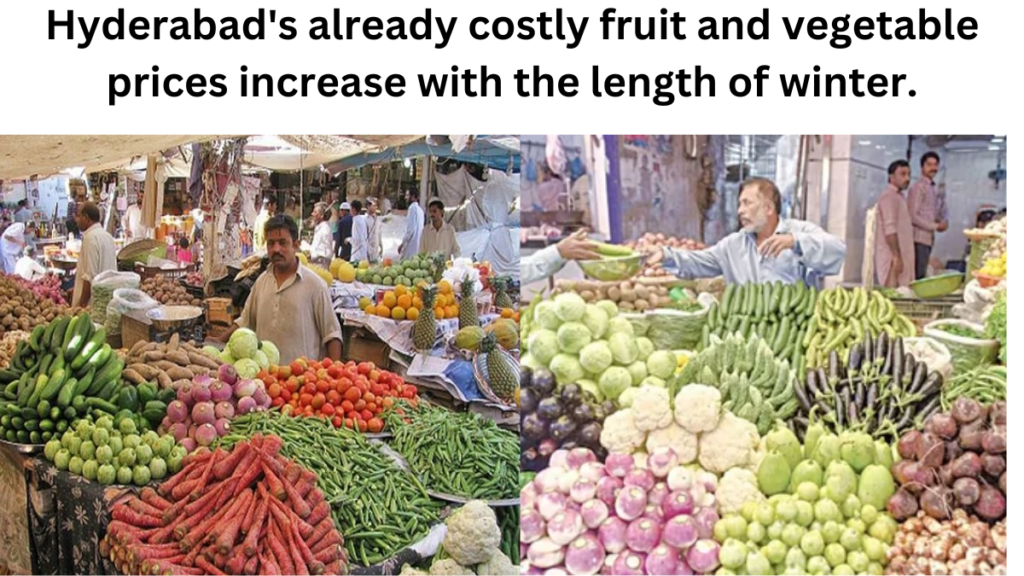Hyderabad’s already costly fruit and vegetable prices increase with the length of winter.

HYDERABAD:
In addition to the customary increase in vegetable and fruit prices before Ramadan, this year’s extended winter into March blocked vegetable and fruit growth, resulting in insufficient supply reaching retail marketplaces and further rising prices. Both middle-class and low-income consumers have been impacted by the price spiral.
Vegetables like okra, tomatoes, cabbage and fruits like melon are unavailable in required quantities in markets while the fasting month is about to begin.
Consumers are seen opting for wholesale vegetable markets to avoid impact of inflation and price-hike thus saving a substantial amount to meet other expenses in the holy month. Bulk supplies of vegetables are reported from wholesale market. The weather has been changing, said progressive grower Mahmood Nawaz Shah, who also has vegetable and mango trees. In his farmland, he installed a “weather station,” which he claimed recorded a temperature of between 10 and 11 degrees Celsius. The weather has been changing, according to progressive grower Mahmood Nawaz Shah, who also has vegetable and mango trees. In his farmland, he installed a weather station, which he said recorded a temperature of between 10 and 11 degrees Celsius.
While on the current second winter spell that is being experienced in March, the temperature has dropped to even seven or eight degrees Celsius,” he stated. He acknowledges that the current weather is unusual for fruits and vegetables.
Artificial price-hike:
Vegetables are seen as sensitive. Market participants always raise prices ahead of Ramadan in order to profit from fruits and vegetables. They rationalize this by putting the pattern on a large discrepancy between demand and supply. Okra has been impacted by the extended winter because it is often used at the start of summer. Nadeem Shah, who grows onion regularly, says that okra has perished due to the cold. “I feel the crop will have to be re-cultivated,” he said. In March last year, cotton – a summer crop — had shown germination which is not the case this year, he points out.
Market players capitalize on shortage,
Increased demand ahead of Ramadan
According to Haji Shabbir Kashmir, okra’s 40kg bag is selling at Rs6,000 to Rs7,000 (or Rs200 per kilo in retail) these days when compared with last year’s price of Rs3,000 to Rs4,000 per 40kg (or Rs125 per kg in retail). Similar to this, he claims that a 16 kg bag of tomatoes is now available for Rs 2,200, down from R400–R500 during the previous year. He stated, “Due to unfavorable weather, okra is arriving in the market with short intervals, and as a result, consumers have to pay more for it than they usually pay in the summer.
No mechanism to regulate cultivation:
Haji Shabbir also notes that since there is no mechanism in place to regulate major crops, vegetables or fruits, growers often go for an overkill of any particular fruit or vegetable for making an extra buck; and this crashes the market. Come next year, he argues, it leads to inadequate supplies or simple shortage of this very commodity. Not only consumers but growers suffer alike financially, he says. Onion – a vital cooking ingredient – is grown mainly in Sindh and meets requirement of the rest of the country. It keeps coming up, more or less, throughout the year due to different cult Onion – a vital cooking ingredient – is grown mainly in Sindh and meets requirement of the rest of the country. It keeps coming up, more or less, throughout the year due to different cultivation and harvesting cycles. According to Nadeem Shah, a well-known illness caused an important amount of the onion crop to be destroyed last year. The cycle of market supply appears to be still being impacted by the shortage of onion cultivation.
Official prices:
Price lists are issued by the Market Committee Hyderabad but a survey indicates that the retail prices offered to consumers show a noticeable difference as against the official prices. “The prices will increase even further with the beginning of Ramadan,” says a vendor without demur. Melons that usually make it to the market by late February or early March are either missing or of low quality. Melon is selling at Rs120 to Rs150 per kg whereas tomatoes are available for Rs180 to Rs160 per kilo. Fruits like kinnow and guava that are now off-season or have been put in cold storages would be marketed at exponentially higher rates as well. Guava being a winter fruit had been in full supplies until recently. Likewise, sapodilla is doing round in the market for Rs150 or Rs200 per kilo and banana for Rs100 to Rs150 a dozen.







